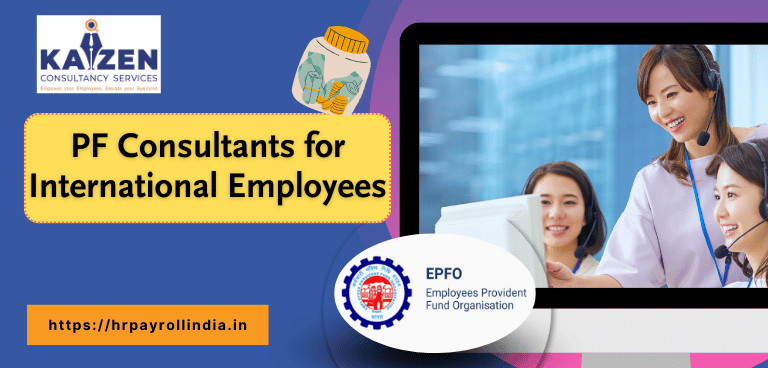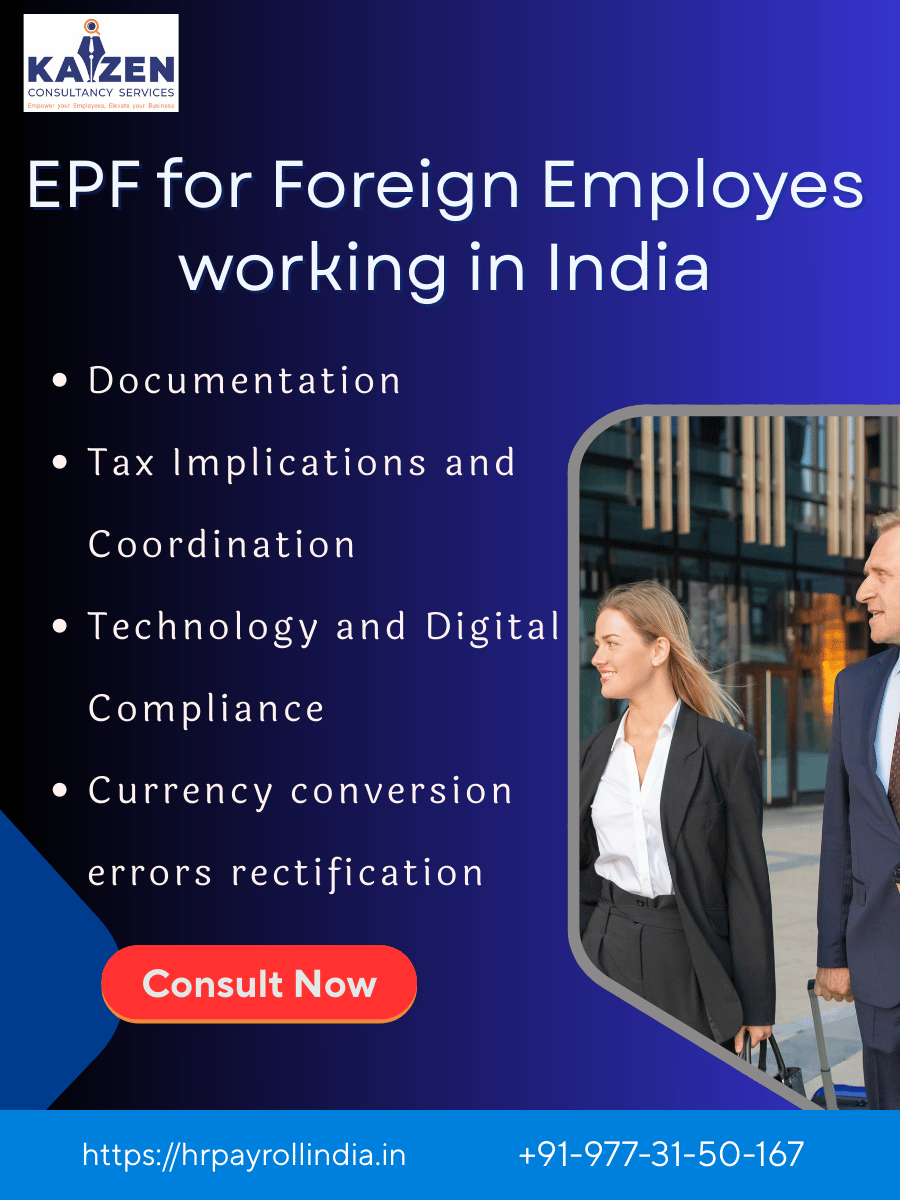PF Consultant for
International Employees
Kaizen Consultancy has been helping businesses in Mumbai navigate the complex world of Employee Provident Fund compliance for over a decade. As a trusted PF consultant in Mumbai, we understand that today’s workplace isn’t limited by borders. With multinational companies setting up offices in India and Indian companies expanding globally, managing PF Consultant for international employees has become one of the most challenging aspects of HR compliance.
Our team at Kaizen Consultancy specializes in making these complex regulations simple for you. We’ve helped hundreds of companies – from small startups to large corporations – manage their EPF obligations for international workforces without the usual headaches and confusion.

Understanding - PF for International Employees Working in India
When foreign nationals come to work in India, EPF compliance becomes quite tricky. The rules aren't always straightforward, and there are several factors that determine whether these employees need to contribute to EPF or not.
The basic rule is simple: if a foreign national is working in India and earning a salary, they generally need to be covered under EPF. However, there are important exceptions and special considerations that every employer must understand. The Employee Provident Fund Organization (EPFO) has specific guidelines for international employees, but interpreting these correctly requires expertise that most companies don't have in-house.
Many companies make the mistake of assuming that all foreign employees are exempt from EPF. This isn't true and can lead to serious compliance issues later. Similarly, some companies unnecessarily include employees who might be exempt, creating additional administrative burden and costs.
Visa Categories and EPF Eligibility
The type of visa a foreign employee holds plays a crucial role in determining their EPF eligibility. Different visa categories have different implications for EPF compliance.
Employment Visa (E-Visa): Foreign nationals on employment visas are typically required to contribute to EPF. These employees are considered regular employees of Indian companies and must be treated like Indian employees for EPF purposes.
Business Visa: Employees on business visas who are on short-term assignments (usually less than 180 days) may be exempt from EPF contributions. However, this exemption isn't automatic and depends on the specific nature of their work and employment relationship.
Project Visa: Foreign nationals on project visas working on specific projects in India usually need EPF coverage. The duration and nature of the project determine the exact requirements.
The key thing to remember is that visa category alone doesn't determine EPF eligibility. The actual employment relationship, salary structure, and duration of stay all matter. This is where having a knowledgeable PF consultant in Mumbai like Kaizen Consultancy becomes invaluable.
Reciprocal Social Security Agreements
India has signed social security agreements with several countries to avoid double taxation and ensure that employees don't lose their social security benefits when working abroad. These agreements significantly impact EPF compliance for international employees.
Countries like Germany, France, Belgium, Switzerland, and several others have such agreements with India. Under these agreements, employees from these countries may be exempt from contributing to Indian EPF if they continue contributing to their home country's social security system.
However, obtaining this exemption isn't automatic. Companies need to apply for a Certificate of Coverage from the employee's home country and submit it to EPFO. The process can be complex and time-consuming, but it can save significant money for both the employer and employee.
At Kaizen Consultancy, we regularly help companies navigate these agreements. We handle the paperwork, coordinate with international authorities, and ensure that all requirements are met properly.
Documentation Requirements for International Employees
Managing EPF for international employees requires much more documentation than for Indian employees. The paperwork can seem overwhelming, but having the right documents ready makes the process much smoother.
Essential documents include:
- Valid passport with appropriate visa
- Work permit or employment authorization
- Aadhaar card (if available) or alternative identification
- Bank account details in India
- Tax residency certificate (if applicable)
- Certificate of Coverage (for countries with social security agreements)
- Employment contract clearly stating salary and benefits
- Medical examination reports (for certain visa categories)
One common challenge we see at Kaizen Consultancy is companies trying to rush through the documentation process. This often leads to incomplete applications and delays in EPF registration. We always advise our clients to start the documentation process well before the employee's joining date.
Salary Components and EPF Calculation
Calculating EPF contributions for international employees can be more complex than for Indian employees. International employees often have unique salary components that need careful consideration.
Housing allowances, hardship allowances, international assignment premiums, and home country benefits all need to be evaluated to determine what should be included in EPF calculations. Some components are clearly excludable, while others fall into gray areas that require expert interpretation.
Currency fluctuations add another layer of complexity. When part of an employee's salary is paid in foreign currency, determining the EPF contribution amount requires careful currency conversion and documentation.
Tax equalization payments, which are common for international assignments, also need special handling. These payments are meant to ensure that employees don't face tax disadvantages due to their international assignment, but they can complicate EPF calculations significantly.

EPF Compliance for Indian Employees Working Abroad
The other side of international EPF compliance involves Indian employees who are sent on international assignments. This situation has its own set of challenges and requirements.
When Indian employees go abroad for work, maintaining their EPF contributions can be beneficial for their long-term financial planning. However, the rules for continuing EPF contributions during international assignments aren't always clear-cut.
Key considerations include:
- Duration of the international assignment
- Whether the Indian company continues to pay salary
- Tax residency status during the assignment
- Social security agreements between India and the host country
- Employee's preference for continuing contributions
For short-term assignments (typically less than one year), employees can usually continue their EPF contributions without any issues. For longer assignments, the situation becomes more complex, especially if the employee becomes a tax resident of the host country.
Managing EPF During Secondments and Deputation
Secondments and deputations are common in multinational companies, but they create unique EPF compliance challenges. When an Indian employee is seconded to an overseas office, or when a foreign employee is deputated to India, determining EPF obligations requires careful analysis.
The key question is always: who is the actual employer? If an Indian company continues to employ and pay a seconded employee, EPF contributions typically continue. However, if the overseas entity becomes the employer, the EPF obligations may change.
For foreign employees deputated to India, the situation depends on whether they're considered employees of the Indian entity or remain employees of their home country office. This determination affects not just EPF compliance but also tax obligations and visa requirements.
At Kaizen Consultancy, we often work with companies to structure these arrangements in compliance-friendly ways. Sometimes small changes in how the arrangement is structured can significantly simplify EPF compliance without affecting the business objectives.
Common Compliance Challenges and Solutions
Over the years, we've seen companies struggle with several common challenges related to EPF compliance for international employees. Understanding these challenges helps companies avoid costly mistakes.
Late registration is one of the most common issues. Companies often delay EPF registration for international employees, thinking they have more time or that different rules apply. In reality, the same timelines apply regardless of the employee's nationality.
Incorrect salary calculations are another frequent problem. Companies sometimes exclude allowances that should be included or include components that should be excluded. This can lead to incorrect contribution amounts and potential penalties.
Documentation gaps cause significant delays and compliance issues. Missing or incorrect documentation can hold up EPF registration for months, creating problems for both the employer and employee.
Currency conversion errors happen when companies don't use the correct exchange rates or conversion methods. EPFO has specific requirements for how currency conversions should be handled, and not following these can create compliance issues.
Tax Implications and Coordination
EPF compliance for international employees intersects significantly with tax compliance. Understanding how EPF contributions affect tax obligations is crucial for both employers and employees.
For foreign nationals working in India, EPF contributions may be tax-deductible, but this depends on their tax residency status and the provisions of any applicable tax treaties. The tax treatment can significantly impact the net cost of employment.
Indian employees working abroad face complex situations where they need to coordinate EPF contributions with their foreign tax obligations. In some cases, continuing EPF contributions while abroad can create tax complications that need careful management.
Transfer pricing implications also come into play for multinational companies. When the cost of EPF contributions is shared between entities in different countries, transfer pricing documentation becomes important.
Technology and Digital Compliance
The digitization of EPF processes has made compliance easier in many ways, but it has also created new challenges for international employees. Online portals and digital processes aren't always designed with international employees in mind.
Aadhaar integration has been particularly challenging for international employees. While EPFO has made provisions for employees without Aadhaar numbers, the process isn't always smooth, and companies need to understand the alternatives.
Digital signature requirements can be problematic for international employees who may not have Indian digital signatures. Understanding the alternatives and workarounds is important for smooth compliance.
At Kaizen Consultancy, we stay updated with all the latest digital requirements and help companies navigate these technological challenges. We also provide training to companies on using EPFO's digital platforms effectively.
Best Practices for Employers
Managing EPF compliance for international employees requires a systematic approach. Companies that follow best practices find the process much more manageable.
Start the process early. Don't wait until the employee arrives in India to begin EPF registration. Having all documentation ready in advance prevents delays and compliance issues.
Establish clear processes for:
- Document collection and verification
- Salary component classification
- Regular compliance monitoring
- Communication with employees about their EPF benefits
Maintain detailed records of all decisions and interpretations. When dealing with complex international situations, documenting the reasoning behind compliance decisions helps if questions arise later.
Regular training for HR teams is essential. EPF rules for international employees are complex and change periodically. Keeping HR teams updated prevents costly mistakes.

Working with Professional PF Consultants for International Employees in India
Given the complexity of EPF compliance for international employees, many companies find it beneficial to work with specialized consultants. Professional consultants bring expertise and experience that most companies don't have in-house.
When choosing a consultant, look for firms with specific experience in international EPF compliance. General EPF knowledge isn't sufficient for handling the complex situations that arise with international employees.
At Kaizen Consultancy, we provide comprehensive support for PF Consultant for international Employees. Our services include initial assessment, documentation preparation, registration assistance, ongoing compliance management, and representation in case of disputes or audits.
We also provide training to company teams so they can handle routine matters independently while relying on us for complex situations. This approach gives companies the best of both worlds - expert support when needed and internal capability for day-to-day management.
Conclusion
EPF compliance for international employees is complex, but it doesn't have to be overwhelming. With proper understanding, systematic processes, and expert support when needed, companies can manage these requirements effectively.
The key is to start with a clear understanding of the rules, maintain proper documentation, and don't hesitate to seek professional help for complex situations. The cost of expert consultation is usually much less than the cost of compliance mistakes.
Remember, EPF compliance isn't just about following rules - it's about ensuring that your international employees receive the benefits they're entitled to while protecting your company from compliance risks. When done right, proper EPF management becomes a competitive advantage in attracting and retaining international talent.
At Kaizen Consultancy, we're committed to making EPF compliance simple and stress-free for our clients. Whether you're dealing with a single international employee or managing a global workforce, we have the expertise and experience to help you navigate these complex requirements successfully.
